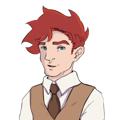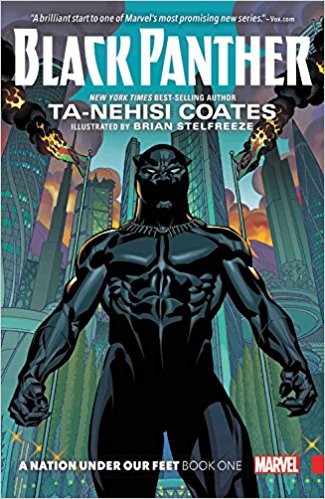Review of 'Black Panther: A Nation Under Our Feet' on 'Goodreads'
3 stars
Original Review:
Stepping away from this first volume I am certainly a bit underwhelmed by what I just read. While there are certainly more than a few things to recommend it, and Marvel did actually end up investing in some real diversity to make it, but I still feel like it could have been more and better. Perhaps it would make more sense if I had ever read anything by Ta-Nehisi Coates before, but bringing in a black author from outside comics to write this still felt like a bit of a cop-out, like Marvel is still convinced that there really is NO diversity in comic book writers even now! It's also another easy out for people who don't like it.
That said, it is an improvement, and seems to be paying off a bit better in the long-term. I just felt like this book was clearly written by someone who had never written (or perhaps even read) a comic before. And in a world where diversity in superhero comics is still on a bit of a knife's edge, I certainly don't blame Coates, but my natural suspicion of Marvel continues.
The art was also a bit of a mixed bag for me. I certainly LOVED the super dramatically lit scenes of Ayo and Aneka. But then, of course, there's Zenze's outfit feels downright physically impossible! It was refreshing to see so many blatantly black characters in one comic though, and so many ladies being cool and kick-ass.
I just wish it frankly hadn't been so gosh darn confusing! I'm not a total superhero noob, but I felt completely lost. And that is probably a big part of why I'm coming across as so incredibly harsh. I'm going to stick with it because I do hear good things about this as a whole and it's fairly drowning in potential. The first impression though was a bit disappointing.
Updated and Expanded Review:
Today I'm releasing a re-review of the first volume of Black Panther: A Nation Under our Feet Book 1. While I could have just repackaged my previous review in my new channel style, I've found it pretty interesting to dive back into this series with a few iotas more context, namely reading the first volume of the Marvel NOW! Avengers World. Which softened my main criticism of this volume, which was that it was overly complicated (especially for a first volume in particular), since this Avengers volume also felt overly complicated. So maybe it can all be chalked up to a company culture that says comics must be overly complicated? because obviously that equals smart!
Do I wish that they had tapped an established fiction and/or comic black talent who might have been more concise and/or punchy? Sure. My paranoid side just felt like it was a bit of a set up at the time. Putting someone so well known but untested on such a pivotal title at such a pivotal time to throw them off the glass cliff as it were. We're getting Black Panther 2 though so I guess it doesn't really matter now, so whatever, I have enjoyed Coate's books, now on with the review.
Black Panther, Nation Under Our Feet Book One came out in 2016 and was part of the lead up to the Black Panther movie (which was generally awesome sans random CIA agent). It was written by Ta-Nehisi Coats with art by Brian Stelfreeze. Laura Martin (color artist) VC's Joe Sabino (Letterer) Wil Moss (Editor) Tom Brevoort (Executive Editor) Chris Robinson (Assistant Editor). Ta-Nehisi Coats is a black man, born in Baltimore, he is a prolific writer for not only the atlantic but also for such books as Between the world and Me, and We Were 8 Years in Power. He has been awarded a McArthur Genius award so that's cool. Brian Stelfreeze is also a black man who has worked as an artist on such series as Batman, Fallen Angel, and Wednesday Comics - and so much more!
Turning over the book for the official description - A new era begins for the Black Panther! T-Nehisi Coates takes the helm, confronting T'Challa with a dramatic upheaval in Wakanda that will make leading the African nation tougher than ever before. When a superhuman terrorist group that calls itself The People sparks a violent uprising, the land famed for its incredible technology and proud warrior traditions will be thrown into turmoil. If Wakanda is to survive, it must adapt--but can its monarch, one in a long line of Black Panthers, survive the necessary change? Heavy lies the head that wears the cowl!
Obviously as a monarchy up against a populist movement plot the likeliness of amazing politics is kind of low, but the way that the populist movement is described (either because of Coates or due to Marvel) really is not great. Blaming the dissatisfaction of the populace on a bitchy witch and her magical powers is kind of gross. Not to mention how, while her outfit covers most key areas as to not sexualize her too much, it defies gravity to do so. Thankfully the plot is complicated a bit by some rogue dora milaje - who are also the best when it comes to their dramatic silhouette visuals as well.
Despite feeling like it was more of Marvel thing overall, I can't not mention that this book was pretty unnecessarily confusing. And way too many people just sitting around talking. Not that I have anything against talking, but these are supposed to be action comics!
Looking back at the art, despite Zanzi's outfit making literally no sense, otherwise the art is pretty top notch for Black Panther comics and Marvel etc. The black characters are coloured well, and there's a variety of shades included. The nappy hair is detailed, although not reaching the variety of hairstyles found in Roxanne Gay's spin-off series. The way that some characters are rendered as silhouettes is quite nice and pleasing to my eye at least. And no matter the couple of times that women end up not wearing much (or men for that matter) everyone's treated pretty respectfully and I didn't feel like I was being encouraged to leer (or imagine fucking) any of these characters.
As far as gender and sexuality goes, this volume did include one of the more exciting things ultimately contradicted in the movie, and that was the lesbian relationship between Aneka and Ayo, two black women who are part of an organization that first appeared as a harem of potential wives for the Black Panther. And, now having read a few other Black Panther titles, the treatment of the Dora Milaje overall is done much better then titles that came out sooner - thankfully this was not scrapped in the movie, which had some of the best female representation in the MCU so far IMHO.
Class, as I previously discussed, is a big issue in this series so far. I can't agree with the way it is presented so far, but it is at least acknowledged. And race, the fact that this story is populated almost exclusively by black characters, written and drawn by black men, is pretty cool. Could always use more, but it's a thing.

